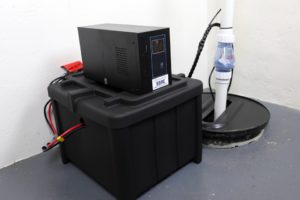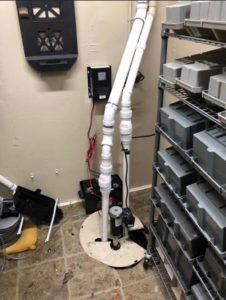In today’s tech-driven world, uninterrupted power supply is crucial for businesses and individuals alike. Battery backup systems serve as a lifeline during power outages, ensuring smooth operations and safeguarding critical data. However, like any other equipment, these systems require regular maintenance to perform optimally and extend their lifespan. In this comprehensive guide, we’ll delve into the importance of battery backup system maintenance and outline essential practices to keep your home backup system always running efficiently.
1. Understanding the Importance of Maintenance
Maintenance is the cornerstone of ensuring the optimal functionality and longevity of battery backup systems. By comprehending the significance of maintenance, businesses and individuals can proactively safeguard their investments more power, and mitigate the risks associated with power interruptions. Let’s delve deeper into why maintenance is paramount:
Ensuring Reliability:
Reliable power supply is non-negotiable for businesses across various industries. In an era where downtime equates to lost revenue and damaged reputation, the reliability of battery backup systems cannot be overstated. Regular maintenance ensures that these systems are primed to kick in seamlessly during power outages, providing uninterrupted power to critical operations, sensitive equipment, and data centers. Whether it’s a power outage for a brief hiccup or an extended blackout, the reliability of backup power systems can be the difference between business continuity and costly disruptions.
Protecting Investments:
Battery backup systems represent a significant investment for businesses of all sizes. From the initial purchase and installation costs to ongoing operational expenses, the financial outlay associated with these systems is substantial. Neglecting maintenance can lead to premature degradation of components, reduced efficiency, and ultimately, system failure. By implementing a proactive maintenance regimen, businesses can protect their investments and maximize the return on their expenditure. Regular inspections, testing, and servicing not only extend the lifespan of battery backup systems but also minimize the risk of unexpected breakdowns and the need for costly replacements.
Ensuring Safety and Compliance:
Beyond reliability and financial considerations, maintenance plays a crucial role in ensuring the safety of personnel and compliance with regulatory standards. Faulty or poorly maintained battery backup systems pose inherent safety risks, including electrical hazards, thermal runaway, and fire hazards. Regular maintenance helps identify and rectify potential safety issues before they escalate, thereby creating a secure working environment for employees and minimizing liability for businesses. Moreover, adherence to maintenance protocols demonstrates compliance with industry regulations and standards, which is particularly important in sectors with stringent safety requirements such as healthcare, telecommunications, and manufacturing.
Enhancing Operational Efficiency:
Efficiency is key to optimizing the performance of battery backup systems and minimizing operational costs. Over time, factors such as battery degradation, dust accumulation, and component wear can compromise the efficiency of these systems, leading to increased energy consumption and reduced effectiveness during power outages. Through routine maintenance, businesses can address inefficiencies, fine-tune system settings, and optimize performance parameters to ensure optimal energy utilization and seamless operation. By maximizing energy capacity and operational efficiency, maintenance not only reduces operating expenses but also enhances the overall effectiveness of battery backup systems in mitigating the impact of power disturbances.
2. Components of Battery Backup Systems
Battery backup systems comprise several integral components of electricity itself, each playing a vital role in ensuring uninterrupted power supply during outages. Let’s delve into the key components that constitute these systems:
Batteries: At the heart of every battery backup system lies the battery itself, acting as the primary energy storage unit. These batteries come in various types, including lead-acid, lithium-ion, and nickel-cadmium, each offering unique characteristics suited to different applications. For instance, lead-acid batteries are robust and cost-effective, making them ideal for standby power applications, while lithium-ion batteries boast high energy density and fast charging capabilities, suitable enough to power up for demanding environments. Regardless of the type, batteries require meticulous maintenance to preserve their capacity and longevity. Regular inspections, voltage measurements, and capacity tests are essential to detect signs of degradation and ensure optimal performance.
Charging System: The charging system is responsible for replenishing the energy stored in batteries and maintaining them at the desired state of charge. This system typically consists of a charger and associated control circuitry, ensuring that batteries are charged efficiently and safely. Analogous to a diligent caretaker, the charging system monitors battery voltage, current, and temperature, adjusting charging parameters as needed to prevent overcharging or undercharging. Additionally, modern charging systems may incorporate intelligent features such as temperature compensation and equalization charging to prolong battery life, save, and enhance performance.
Inverter: During power outages, battery backup systems rely on inverters to convert stored DC (direct current) power into AC (alternating current) power compatible with the electrical devices they support. Inverters act as the bridge between the battery bank and the load, seamlessly switching from grid power to battery power when needed. Like a versatile translator switch, inverters must ensure smooth communication between the battery and connected devices, maintaining voltage stability and waveform integrity. Advanced inverters may feature pure sine wave output, mimicking the quality of utility power and ensuring compatibility with sensitive electronics such as computers and medical equipment.
Monitoring and Control Systems: Monitoring and control systems serve as the brains of battery backup systems, overseeing their operation, performance, and safety. These systems employ sensors, controllers, and user interfaces to provide real-time data on battery status, charging progress, and system diagnostics. Think of them as vigilant guardians, continuously monitoring the health and integrity of the system and alerting users to any anomalies or potential issues. With remote monitoring capabilities, users can conveniently access system data and receive alerts via smartphones or web interfaces, enabling proactive management and timely intervention when necessary.
3. Essential Maintenance Practices
Maintaining a battery backup system isn’t just about reacting to issues; it’s about proactively managing the health and performance of critical components to ensure an uninterrupted power supply. Here are the essential maintenance practices to uphold the reliability and longevity of your battery system:
Regular Inspections:
Routine visual inspections serve as the first line of defense against potential issues. Regularly examine the battery enclosure, connections, and surrounding environment for signs of corrosion, leaks, or physical damage. Pay close attention to battery terminals, ensuring they are clean and free from oxidation, which can impede conductivity and compromise performance. Additionally, inspect cables, fuses, and circuit breakers for signs of wear or overheating, addressing any abnormalities promptly to prevent further damage.
Battery Testing:
Battery performance can degrade over time due to factors such as cycling, temperature fluctuations, and sulfation. Conduct regular capacity tests to assess the health and performance of batteries accurately. Load testing, impedance testing, and conductance testing are common methods used to evaluate battery conditions and identify potential issues such as high internal resistance or reduced capacity. By monitoring battery health proactively, you can anticipate maintenance needs, replace deteriorating batteries promptly, and avoid unexpected failures during power outages.
Cleaning and Ventilation:
Maintaining a clean and well-ventilated environment is essential for optimal battery performance and longevity. Dust, dirt, and debris can accumulate on battery surfaces, inhibiting heat dissipation and promoting corrosion. Periodically clean battery enclosures and ventilation openings using a soft brush or vacuum to remove contaminants and ensure adequate airflow. Additionally, monitor ambient temperature and humidity levels, as excessive heat or moisture can accelerate battery degradation and shorten lifespan. Proper ventilation helps dissipate heat effectively, maintaining optimal operating conditions for batteries and associated components.
Firmware Updates:
Keep abreast of manufacturer recommendations and install firmware updates promptly to ensure optimal system performance and compatibility. Firmware updates may include bug fixes, performance enhancements, and security patches designed to address known issues and vulnerabilities. Regularly check for updates from the manufacturer or authorized service providers and follow recommended procedures for installation and testing. By keeping firmware up-to-date, you can enhance system reliability, address potential software-related issues, and leverage new features and functionalities to improve overall performance.
Record Keeping:
Maintain detailed records of maintenance activities, test results, and system performance data to track trends and identify potential issues over time. Document inspection dates, test results, maintenance tasks performed, and any observations or recommendations for future action. Establishing a comprehensive maintenance log enables you to demonstrate compliance with regulatory requirements, track the history of system interventions, and make informed decisions regarding maintenance priorities and resource allocation. Regularly review and analyze maintenance records to identify patterns, address recurring issues, and optimize maintenance schedules for maximum efficiency and effectiveness.
Training and Education:
Invest in training and education for personnel responsible for the operation and maintenance of battery backup systems. Ensure that staff members are equipped with the knowledge and skills required to perform maintenance tasks safely and effectively. Provide training on equipment operation, troubleshooting techniques, and best practices for battery maintenance and handling. Additionally, stay informed about industry developments, emerging technologies, and regulatory changes related to battery backup systems. Continuous learning and professional development empower maintenance personnel to identify potential issues proactively, implement best-in-class maintenance practices, and optimize system performance to meet evolving operational needs.
4. Scheduled Maintenance Tasks
Scheduled maintenance tasks form the backbone of a proactive approach to ensuring the reliability and longevity of battery backup systems. By adhering to a structured maintenance schedule, businesses can minimize the risk of unexpected failures, optimize system performance, and extend the lifespan of critical components. Here’s a closer look at the key tasks involved in scheduled maintenance:
Quarterly Maintenance:
Quarterly maintenance serves as a comprehensive check-up for battery backup systems, providing an opportunity to assess system health and address any emerging issues before they escalate. During quarterly maintenance, conduct thorough inspections of all system components, including batteries, charging systems, inverters, and monitoring equipment. Perform load testing to evaluate battery capacity and integrity, ensuring that batteries can deliver the required power during outages. Additionally, measure voltages, currents, and temperatures to identify any deviations from normal operating parameters. Quarterly maintenance also involves cleaning battery enclosures, terminals, and ventilation openings to remove contaminants and optimize airflow for efficient heat dissipation.
Annual Servicing:
Annual servicing involves more in-depth inspections, testing, and calibration to maintain the performance and reliability of battery backup systems over the long term. Engage professional technicians or authorized service providers to conduct annual servicing, as they possess the expertise and specialized equipment required for comprehensive system analysis and maintenance. During annual servicing, technicians perform detailed battery testing, including impedance testing, conductance testing, and capacity testing, to assess battery health accurately. They also inspect and calibrate charging systems, inverters, and monitoring equipment to ensure optimal operation and compliance with manufacturer specifications. Additionally, annual servicing may involve firmware updates, software optimizations, and system performance audits to address any underlying issues and enhance overall reliability.
Documentation and Reporting:
Documenting scheduled maintenance tasks and outcomes is essential for tracking system performance, compliance with maintenance schedules, and adherence to regulatory requirements. Maintain detailed records of quarterly and annual maintenance activities, including inspection reports, test results, maintenance logs, and service tickets. Record observations, recommendations, and any corrective actions taken during maintenance visits to facilitate informed decision-making and future planning. Regularly review maintenance documentation to identify trends, assess the effectiveness of maintenance practices, and prioritize follow-up actions as needed. Comprehensive documentation and reporting provide valuable insights into system health, facilitate regulatory compliance, and support continuous improvement initiatives aimed at optimizing system performance and reliability.
5. Importance of Professional Support
While regular maintenance performed by in-house staff is essential for the upkeep of battery backup systems, the expertise and specialized skills offered by professional support are invaluable for ensuring optimal performance and reliability. Here’s why professional support is crucial:
Expertise and Experience: Professional technicians bring a wealth of expertise and experience to the table, honed through years of training and hands-on experience in working with battery backup systems. They possess in-depth knowledge of system components, maintenance procedures, and troubleshooting techniques, allowing them the ability to identify and address issues efficiently. Whether it’s diagnosing complex problems, optimizing system settings, or implementing best practices for battery maintenance, professional technicians have the skills and know-how to ensure that battery backup systems operate at peak performance.
Preventive Maintenance Contracts: Many professional service providers offer preventive maintenance contracts tailored to the specific needs of businesses and organizations. These contracts typically include regular inspections, testing, and servicing performed according to predefined schedules and service level agreements. By engaging in preventive maintenance contracts, businesses can ensure that their battery backup systems receive the attention and care they require consistently. Preventive maintenance contracts provide peace of mind, knowing that trained professionals are monitoring and maintaining critical infrastructure to minimize the risk of unexpected failures and downtime.
Specialized Tools and Equipment: Professional technicians have access to specialized tools and equipment designed for testing, calibration, and maintenance of battery backup generator systems. From battery analyzers and load testers to thermal imaging cameras and diagnostic software, these tools enable technicians to perform comprehensive system analysis and troubleshooting with precision and efficiency. By leveraging advanced tools and equipment, professional technicians can identify underlying issues, diagnose problems accurately, and implement targeted solutions to optimize system performance and reliability.
Compliance and Regulations: Battery backup systems are subject to regulatory requirements and industry standards governing their installation, operation, and maintenance. Professional service providers stay abreast of evolving regulations and compliance requirements, ensuring that maintenance activities adhere to applicable standards and guidelines. By partnering with professional support, businesses can mitigate compliance risks, demonstrate adherence to regulatory requirements, and avoid potential penalties or liabilities associated with non-compliance. Professional technicians are well-versed in regulatory requirements such as NFPA 110, IEEE standards, and local building codes, ensuring that battery backup systems are maintained by industry best practices and regulatory mandates.
Emergency Response and Priority Support: In the event of an unexpected system failure or emergency, professional support offers rapid response times and priority support to minimize downtime and restore operations quickly. Professional service providers maintain 24/7 emergency hotlines and dispatch teams of trained technicians equipped to handle urgent service requests and critical system failures. By having access to emergency response services, businesses can mitigate the impact of unforeseen events, such as power outages or equipment failures, and ensure continuity of operations even in the face of adversity.
In conclusion, proactive battery backup system maintenance is essential for ensuring reliability, protecting investments, and maximizing operational efficiency. By adhering to scheduled maintenance tasks, conducting regular inspections, and seeking professional support when needed, businesses and individuals can enjoy an uninterrupted power supply and prolonged system lifespan. Remember, maintenance is not just a reactive measure but a proactive strategy to mitigate risks and optimize performance in the long run. Invest in the upkeep of your battery backup systems and appliances today to secure a reliable power supply tomorrow.
Contact the Professionals at Everdry Louisville Waterproofing Company Today! (502) 437-2061

Everdry Waterproofing is one of the nation’s largest Basement waterproofing companies. Everdry specializes in basement waterproofing, crawlspace waterproofing, foundation repair and basement ventilation. Our patented, safe and 100% effective waterproofing method can be used on foundations consisting of poured concrete, block, brick, stone, red clay tile plus crawlspaces and slabs. We have been in business for more than 40 years and have over 85,000 “RAVING FANS.”
